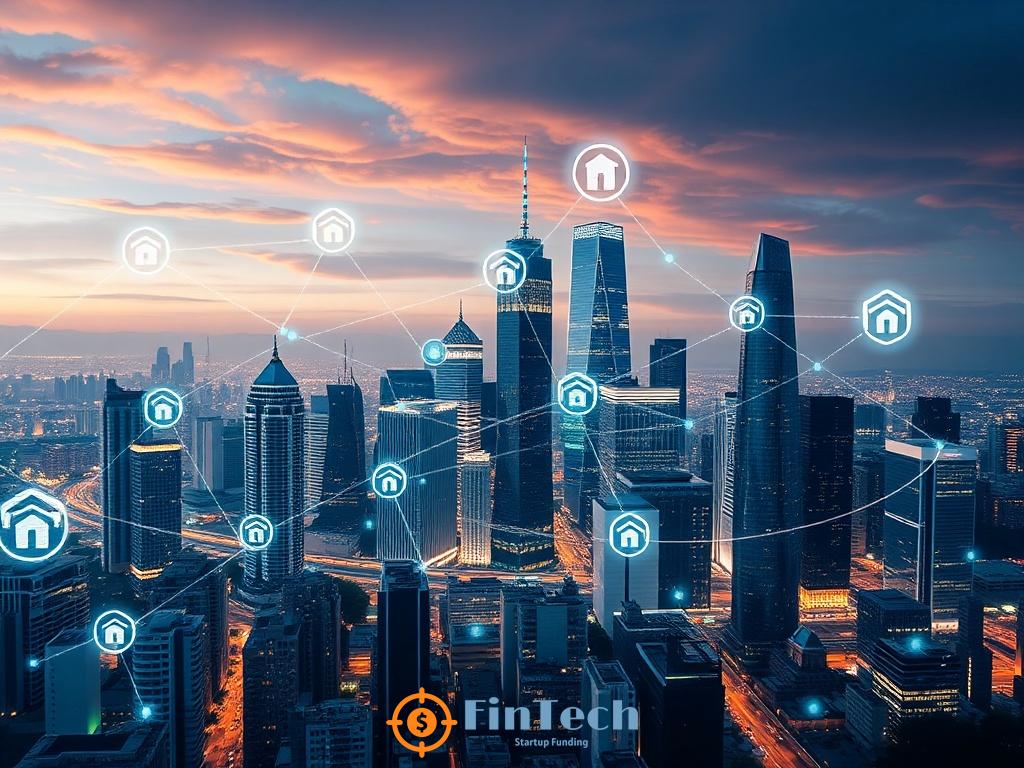Understanding Tokenization in Real Estate
The landscape of real estate investment has undergone a significant transformation over the past few decades. With the advent of technology, traditional methods of buying and selling properties have evolved to incorporate innovative solutions. One such advancement is the concept of tokenization, which has emerged as a game-changer in the real estate sector. Tokenization refers to the process of converting ownership rights of a real estate asset into a digital token that can be traded on a blockchain platform. This not only enhances liquidity but also democratizes access to real estate investments for a broader audience.
Tokenization offers a multitude of advantages that can benefit both investors and property owners. By breaking down real estate assets into smaller, tradable units, tokenization allows for fractional ownership, making it possible for individuals to invest in high-value properties without needing substantial capital. Moreover, the blockchain technology underlying tokenization ensures transparency and security, as all transactions are recorded and immutable.
Here are some key benefits of tokenizing real estate assets:
- Increased Liquidity: Tokenized assets can be traded on secondary markets, providing investors with greater liquidity compared to traditional real estate investments.
- Lower Barriers to Entry: Fractional ownership allows more investors to participate in the real estate market.
- Enhanced Transparency: Blockchain technology ensures that all transactions are transparent and easily verifiable.
- Global Reach: Investors from around the world can easily access tokenized real estate assets.
- Efficient Transactions: Smart contracts streamline transactions, reducing the need for intermediaries.
Despite its numerous benefits, tokenization in real estate is not without challenges. Regulatory uncertainty remains a significant hurdle, as laws and regulations surrounding digital assets vary widely across jurisdictions. Additionally, while blockchain technology provides enhanced security, it is still susceptible to hacks and fraud if not implemented correctly.
Furthermore, education and awareness about tokenization among potential investors is essential for widespread adoption. As the market evolves, stakeholders must work collaboratively to develop frameworks that ensure the protection of investors while fostering innovation in the real estate sector.
The Role of Blockchain in Real Estate Collateralization

The integration of blockchain technology into the real estate sector is not merely a trend; it represents a fundamental shift in how assets are perceived, valued, and utilized for collateralization. As tokenized real estate assets gain traction within the FinTech landscape, understanding the pivotal role of blockchain becomes essential for investors and financial institutions alike. This technology not only enhances the efficiency of transactions but also provides a robust framework for securing investments through collateralization.
Transforming Asset Liquidity and Value Assessment
Traditionally, real estate investments have been illiquid, making it challenging for investors to leverage their assets as collateral. However, with the advent of blockchain, tokenization enables properties to be divided into smaller, tradable units, significantly increasing liquidity. Investors can now utilize these tokenized assets to secure loans or financing, thereby unlocking capital that was previously inaccessible. This transformation is critical in a rapidly changing financial environment where quick access to funds is often essential.
Ensuring Security and Trust in Transactions
One of the most compelling features of blockchain technology is its ability to ensure the integrity and security of transactions. Each transaction involving tokenized real estate is recorded on a decentralized ledger, making it nearly impossible to alter or forge records. This level of transparency fosters trust among stakeholders and mitigates the risks associated with collateralized loans. Financial institutions can confidently assess the value of tokenized real estate assets, knowing that the underlying data is secure and verifiable.
Setting a New Standard for Valuation and Risk Assessment
Blockchain’s role in real estate collateralization extends beyond mere transaction security. The technology enables real-time data access, allowing investors and lenders to evaluate asset performance continuously. Unlike traditional methods that rely on periodic appraisals, blockchain provides dynamic insights into property values based on market conditions. This capability not only streamlines the risk assessment process but also allows for more informed decision-making when using real estate as collateral.
As the landscape of real estate investment continues to evolve, the role of blockchain in collateralization will undoubtedly become more pronounced. By enhancing liquidity, ensuring security, and setting new standards for valuation, blockchain technology is poised to revolutionize how real estate assets are utilized within the FinTech realm. Stakeholders who adapt to these changes stand to benefit significantly in an increasingly competitive market.
Regulatory Challenges in Tokenized Real Estate
The rise of tokenized real estate presents a myriad of opportunities for investors and financial institutions alike, but it simultaneously brings forth a complex web of regulatory challenges. As this innovative investment model gains traction, understanding the regulatory landscape becomes crucial for stakeholders aiming to capitalize on its potential. With jurisdictions worldwide grappling to establish coherent frameworks, the path to successful implementation is fraught with uncertainties.
At the forefront of the challenges faced in tokenized real estate are regulatory hurdles that vary significantly across jurisdictions. The lack of a unified regulatory approach poses difficulties for investors and companies looking to navigate this evolving landscape. In many regions, existing securities laws may inadvertently classify tokenized assets as securities, subjecting them to stringent compliance requirements. This can increase the costs and complexity of launching tokenized real estate projects.
Moreover, the regulatory environment is in a state of flux, with governments and regulatory bodies actively seeking to adapt their frameworks to accommodate the rise of blockchain technology and tokenization. The absence of clear guidelines can lead to uncertainty, deterring potential investors and delaying the growth of tokenized real estate markets. As stakeholders strive for regulatory clarity, engaging with policymakers and advocating for balanced regulations will be essential.
Another critical aspect of the regulatory challenges in tokenized real estate is ensuring investor protection while maintaining market integrity. As tokenized assets become more mainstream, the risk of fraud and misrepresentation increases, necessitating robust consumer protection measures. Regulatory bodies face the challenge of crafting policies that safeguard investors without stifling innovation.
Furthermore, the decentralized nature of blockchain technology complicates traditional oversight mechanisms. Regulators must adapt their approaches to effectively monitor tokenized transactions and enforce compliance. This need for innovative regulatory solutions highlights the importance of collaboration between industry stakeholders and regulators to establish a secure and trustworthy environment for investors.
In summary, while tokenized real estate offers transformative potential for collateralization in the FinTech landscape, navigating the regulatory challenges is paramount. By fostering dialogue and collaboration among all parties, the industry can work towards creating a regulatory framework that promotes innovation while protecting investors, ultimately paving the way for a more robust and inclusive real estate investment ecosystem.
Benefits of Tokenized Assets for FinTech Solutions
In the rapidly evolving landscape of finance and real estate, tokenized assets are emerging as a cornerstone for innovative financial solutions. Tokenization, which facilitates the conversion of physical real estate into digital assets, not only streamlines investment processes but also introduces a plethora of benefits for financial technology (FinTech) solutions. By leveraging blockchain technology, tokenized assets are poised to enhance efficiency, reduce costs, and democratize access to investment opportunities.
One of the primary advantages of tokenized assets within FinTech is their potential to significantly enhance liquidity. Traditionally, real estate is known for its illiquid nature, often requiring considerable time and effort to buy or sell properties. However, tokenization allows these assets to be divided into smaller, tradeable units, enabling investors to buy and sell fractions of properties on secondary markets. This newfound liquidity not only attracts a broader range of investors but also allows them to react more swiftly to market changes—a crucial factor in today’s fast-paced financial environment.
Tokenized assets also play a vital role in promoting financial inclusion. By breaking down high-value real estate into smaller, affordable tokens, these assets open doors for individuals who previously lacked the capital to invest in such markets. This democratization of investment means that retail investors can now participate alongside institutional players, fostering a more equitable investment landscape. Furthermore, the global nature of blockchain technology enables investors from diverse geographical locations to access these assets, effectively removing traditional barriers to entry.
Moreover, the integration of smart contracts into tokenized real estate transactions introduces a level of automation and efficiency that was previously unattainable. Smart contracts can facilitate automatic execution of transactions once predefined conditions are met, reducing the need for intermediaries and thereby cutting transaction costs. This not only accelerates the process but also minimizes human errors, further enhancing the security of transactions.
Another significant benefit of tokenized assets is the inherent transparency they offer. Blockchain technology records every transaction on a decentralized ledger, ensuring that all data is immutable and easily verifiable. This level of transparency builds trust among investors and financial institutions, as they can independently verify ownership and transaction history without relying on third-party verification. In an era where trust is paramount, this feature can significantly enhance investor confidence in tokenized real estate investments.
In summary, the advantages of tokenized assets for FinTech solutions are manifold. From increasing liquidity and accessibility to enhancing transparency and reducing transaction costs, these assets are setting a new standard in the realm of real estate investment. As the FinTech landscape continues to evolve, embracing tokenization will be critical for stakeholders aiming to stay ahead in an increasingly competitive market.
Future Trends in Tokenized Real Estate Financing
The intersection of tokenized real estate and decentralized finance (DeFi) is poised to reshape traditional financing mechanisms. As investors increasingly seek avenues to maximize returns, the integration of DeFi into real estate offers innovative solutions that enhance accessibility and liquidity. With smart contracts facilitating automatic transactions, the potential for real estate assets to be used as collateral in DeFi protocols is becoming a reality. This evolution not only streamlines the process of securing financing but also democratizes access to capital for a wider audience.
Moreover, the ability to leverage tokenized properties in DeFi platforms allows investors to unlock the value of their assets without needing to liquidate them. The implications of this trend are substantial, as it encourages a more dynamic real estate market where asset ownership and investment opportunities are more fluid.
As tokenized real estate matures, its integration with traditional financial systems is inevitable. Financial institutions are gradually recognizing the advantages of tokenization, paving the way for collaborative models that combine the best of both worlds. This trend is characterized by the establishment of partnerships between blockchain startups and established banks, facilitating the issuance of tokenized mortgages and loans backed by real estate assets.
Such collaborations are likely to result in the development of hybrid financing solutions that retain the security and trust associated with traditional banking while benefiting from the efficiency and transparency of blockchain technology. This dual approach is expected to encourage broader acceptance of tokenized assets within mainstream finance, ultimately leading to a more robust and inclusive investment ecosystem.
Looking ahead, the establishment of enhanced regulatory frameworks and standardization will play a crucial role in the future of tokenized real estate financing. As the market evolves, regulators are beginning to recognize the need for clear guidelines that protect investors while fostering innovation. The adoption of standardized protocols for tokenization will facilitate smoother transactions and mitigate risks associated with fraud and misrepresentation.
Furthermore, as regulatory bodies work towards harmonizing laws across jurisdictions, the global reach of tokenized real estate will expand, enabling cross-border investments and financing opportunities. This increased legitimacy could significantly bolster investor confidence, propelling the growth of tokenized assets in the real estate sector.



